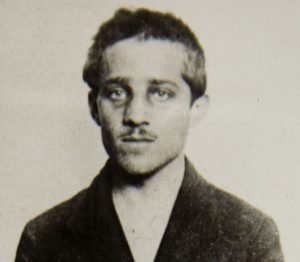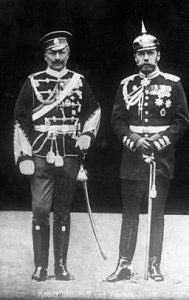Gavrilo Princip

- What does he reveal about the causes of WW1?
Gavrilo Princip, the murderer of Archduke Franz Ferdinand, was just the representative figure of young Serbian influenced population in Bosnia. Therefore, he was not directly responsible for the commencement of the First World War. One of the primary sources written by his comrade, Borijove Jevtic, reveals that their direct goal was to terminate the next ruler of Austria-Hungary, but to stir up a war involving majority of the European nations was not included in their first aims (“The Assassination of Archduke Franz Ferdinand”). According to the Constitution of the Black Hand, it is clearly stated that their focuses are on “national liberation and unification” (“Constitution of the Black Hand”). In this article, it is implicitly demonstrating its central theme; “unification” of the Balkans under the domination of Serbia. “Independence” is only encouraged against their mutual enemy, Austria-Hungary.
The responses of local media of neighboring countries such as Netherlands, France, Poland and Turkey, right after the incident, indicate about the lack of predictions regarding the beginning of the World War 1 (eurnews). At the time the incident had happened, majority of the media did not directly connect this assassination to the gradual upheaval impacting Europe on a global scale. Princip, in terms of his role played in this act, was a puppet. He was even directed by the member of the Black Hand, who were serving for the Serbian government, to kill himself due to his fear of investigators tracing their relationship between the Serbian government and the assassination (Duffy, “Who’s Who – Gavrilo Princip”).
Works Cited in URL links
“The Assassination of Archduke Franz Ferdinand”:
https://wwi.lib.byu.edu/index.php/The_Assassination_of_Archduke_Franz_Ferdinand
“Constitution of the Black Hand”:
https://wwi.lib.byu.edu/index.php/Constitution_of_the_Black_Hand
eurnews. “WWI in historic newspapers: The assassination of Franz Ferdinand”:
http://www.europeana-newspapers.eu/wwi-in-historic-newspapers-the-assassination-of-franz-ferdinand/
Duffy, Michael. “Who’s Who – Gavrilo Princip”:
http://www.firstworldwar.com/bio/princip.htm
Willy and Nicky – Best Friends…at least for Willy
- Why should we bother to learn about the relationship between Willy and Nicky in order to gain further significance regarding the cause of WW1?
Analyzing the relationship between Kaiser and Tsar provides us new insights regarding the process that led up to the German declaration of war against Russia. They were, in fact, cousins. Their relationship depicted in the Willy-Nicky Telegrams gives an impression to the audience that they were cordial to each other, benevolent for an assistance, at least for the beginning (“Willy-Nicky Telegrams”). It seems that they show consistent affection and admiration to each other, often referring to childhood events and shared memories between two of them (“Willy-Nicky Telegrams”). However, by comparing different sources, it is indicated that their relationship was not as simple as it was portrayed in the Willy Nicky Telegrams.
According to the article “The last emperors,” shows their relationship distantly. It is mentioned that: “When he [Nicholas] failed to respond positively, Wilhelm would get angry and encourage anti-Russian elements in his government” (Carter). This implies the personal qualities of Kaiser and Tsar, in which Kaiser often getting jealousy towards his cousin, portraying Kaiser’s immaturity in contrast to Nicholas. Further more, when both of them met in 1913, “George and Nicholas tried to grab private moments to talk, while Wilhelm did his best to stop them, convinced that they were politicking” (Carter). These quotes show Kaiser’s belligerent characteristics in regards with Nicholas. It is clear that both of them did not go along well in terms of friend-like relationships. This complex relationships from their childhood did leave impacts on their diplomatic relationships. This is one of the excerpt from Kaiser’s account in July 1914:
“This shows plainly how little we had expected – much less prepared for – war in July, 1914. When, in the spring of 1914, Czar Nicholas II was questioned by his Court Marshal as to his spring and summer plans, he replied: ‘He resterai chez moi cette année parce que nous aurons la guerre’ (‘I shall stay at home this year because we shall have war’). (This fact, it is said, was reported to Imperial Chancellor von Bethmann; I heard nothing about it then and learned about it for the first time in November, 1918)” (Duffy, “Primary Documents – Kaiser Wilhelm’s Account of the Events of July 1914”).
What is significant about this is that this excerpt reveals that Russia was expecting the coming of the war while Kaiser did not (Duffy, “Primary Documents – Kaiser Wilhelm’s Account of the Events of July 1914”). This means that Russia had more advantages in preparing for war since Tsar had been aware of the tensions between European countries. However, this quote also suggests that German chancellor, Bethmann, failed to report important information to Kaiser (Duffy, “Primary Documents – Kaiser Wilhelm’s Account of the Events of July 1914”). All of these aspects reveal how Kaiser was isolated from both inside and outside, with his cousin gaining more advantages than him, as well as his German chancellor choosing not to share one of the most important information concerning German diplomacy.

Works Cited in URL links:
Carter, Miranda. “The last emperors”:
https://www.theguardian.com/lifeandstyle/2009/sep/12/queen-victoria-royal-family-europe
Duffy, Michael. “Primary Documents – Kaiser Wilhelm’s Account of the Events of July 1914”:
http://www.firstworldwar.com/source/julycrisis.htm
“Willy-Nicky Telegrams”:
https://wwi.lib.byu.edu/index.php/The_Willy-Nicky_Telegrams
Hiromi,
I think that you did a really good job describing the significance of Gavrilo Princip. I really enjoyed reading what you said about him being a puppet in the assassination; while I personally wouldn’t say, I do see where you are coming from.
The relationship between the Kaiser and the Tsar is something that I had not ever considered, and its significance is well explained. I also found it very interesting that their personal relationship reflected their government’s official stance towards one another. However, I don’t think the mention of Bethmann is necessary as I don’t really see how he fits into the dynamic between Wilhelm II and Tsar Nicholas II.
Salutations,
I would agree that WWI was not within most people’s expectations. This is a prime what was originally a tiny dispute escalating to something unnecessarily and ridiculously large. Then again, if we factor the constantly escalating tensions between the European countries, we can say that Serbia was a scapegoat for WWI in the same way that Princip was a scapegoat for Austria-Hungary.
The dynamics between Wilhelm and Nicholas II are constantly changing, it would appear. I take particular note to Kaiser Wilhelm’s belligerence and relative immaturity of reflecting personal affairs onto political matters. The Bethmann part, however, did not exactly compound my comprehension of their relationship. This article also seems to frame Wilhelm in a negative light; how did Nicholas II betray his cousin, if at all?
Hey Hiromi,
I really enjoyed reading about how you brought up the Black Hand constitution into the context of the assassination of Archduke Franz Ferdinand; I agree completely that the purpose of the assassination was not to provoke a world war. So why, then, did the assassination of the Archduke became the primary catalyst that led to World War? Do you think that, even without Princip succeeding in killing the Archduke, a world war would have followed anyway?
I also really like the way you brought up Bethmann-Holwegg; I think that he was definitely one of the key man behind the gradual escalation of World War 1. I disagree with one of the points you brought up, however; you said that “What is significant about this is that this excerpt reveals that Russia was expecting the coming of the war while Kaiser did not”. I find this interpretation quite curious, because Germany was the one who declared war on Russia in the first place (http://www.firstworldwar.com/source/germandeclarationofwar_russia.htm). So I think that it is a bit difficult to say that the Kaiser didn’t expect war, when he was literally the one who most directly created it in the first place.
We can also see in Bethmann’s telegram to the Kaiser (https://wwi.lib.byu.edu/index.php/Wilhelm_II's_Intransigence), that when Bethmann recommends that the Kaiser keep his navy in Norway so as to not disturb the peace, the Kaiser didn’t agree. The Kaiser, having other ideas, decided that it was more important to send the navy to Kiel, next to the Baltic Sea, where he thought there was a chance of a surprise Russian attack (a la Port Arthur a few years prior).
Lastly, we can also see, in Muller’s diary, that when Moltke said that “I consider a war inevitable”, the Kaiser agreed, and asked that the secretary of state work towards making the German people more accepting of the upcoming war (http://germanhistorydocs.ghi-dc.org/sub_document.cfm?document_id=799).
I think that these are all indications that the Kaiser was well aware of the imminent war.
Hello, this is Jeff from RIS and great article by the way. There is still something that I’m quite confused about Gavrilo Princip, was the Serbian government really behind the assassination plot. Some people agreed that the Serbian government did played a part since the member of the black hand are powerful government officials and they are basically a part of the government and the assassins was trained and supplied in Serbia. But other people disagreed because the Black Hand is not a government organization and the Serbian prime minister did send a warning to the Austro-Hungarians. The telegram did show us that during that time the German and Russians action turned into a spiral of destruction and security dilemma. The Kaiser moved his fleet Kiel because he thought that the Russian Baltic fleet might attack Germany but when the German fleet moved the Russians thought that they are attacking so they also moved their fleets. This is a very interesting article by the way.
Hi Hiromi,
This thorough post is definitely gets me thinking as you have raised some interesting points on all parties presented. While I might normally find a conundrum between Princip being identified as a “puppet” yet simultaneously singled out for being historically significant, the key lies in the what the assassination reveals about the start of WWI, just as the prelude question notes.
The choice of the Willy-Nicky relationship / telegrams is very interesting, and yet the analysis seems less focused on historical significance overall. Kudos for incorporating outside resources and interpretations as perspective can always benefit from practice. I am looking forward to reading more of your posts.
Hi Hiromi,
This post shows a very different, from the usual analysis, point of view on Gavrilo Princip’s position and relation to the first World War. You supported your point very well and after reading it, I wholeheartedly agree with your opinion. Their original motives-of not to stir up a war involving majority of the European Nations-are barely being noted and considered when learning about the first World War, perhaps the act that is seen as deontologically-ethical to a person with similar views to a Slav nationalist is seen as a teleological act.